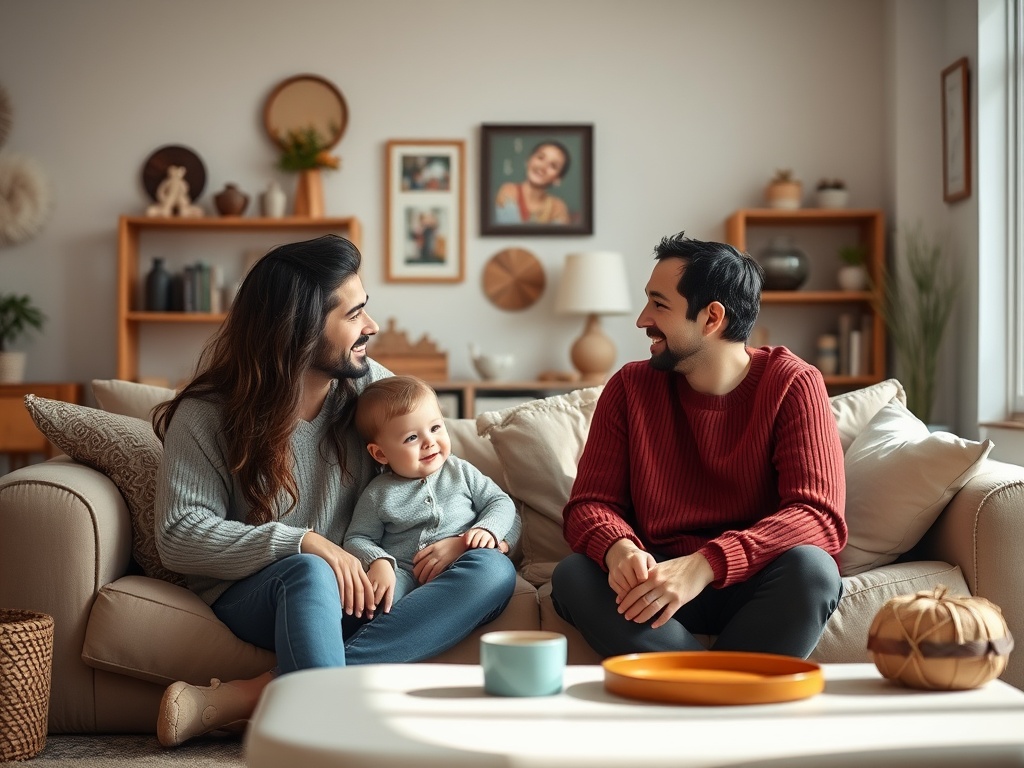Reflections on Family Size: A Personal Journey

Growing up with just one sister—thanks to my mum’s deliberate choice to have a smaller family after being raised in a household of 13 children—I often felt a sense of longing for something more. Our games of tag, hide and seek, and the occasional round of Uno seemed somewhat lackluster with only two players. Consequently, I resolved that when I reached adulthood, I would have three children of my own.
However, after experiencing two childbirths that involved significant blood loss and the intense challenges of sleep deprivation, my husband and I have come to a mutual understanding: we are two and done. My childhood fantasies have gradually given way to the realities of parenting and our shared vision of a comfortable and fulfilling life. Our three-bedroom house and medium-sized car are already at capacity, and the thought of upgrading both to accommodate more children isn’t appealing. We’ve just about mastered our morning and evening routines with two kids and have achieved a work-life balance that feels right.
Travel is also an essential part of our lives. With family and friends scattered across Australia, it has become a non-negotiable aspect of our existence. As a family of four, we’ve visited Australia twice, as well as Dubai, Thailand, Estonia, Greece, France, and South Korea. This half-term, we will be heading to the beautiful Seychelles. We feel we have successfully navigated the complexities of traveling as a family of four, from budgeting to managing time zones and jet lag, to establishing routines, activities, and finding child-friendly food.
From a personal standpoint, I require a fair amount of downtime away from both work and parenting to maintain my mental health. With two children, I already feel pushed to my limits; the thought of adding a third would likely lead to overwhelming stress. Additionally, after enduring pregnancy and childbirth twice, I’m not inclined to put my body through that experience again. It has served me well—the fact that I breastfed both boys for 18 months each fills me with pride. While some might label my perspective as selfish, I believe I am entitled to my feelings.
Interestingly, two children is not far from the national average; families in the UK currently have an average of 1.44 children (based on statistics from births in England and Wales between 2022 and 2023). In fact, there is a growing trend toward smaller families, with approximately 3.7 million one-child families in the UK in 2023, in addition to about 3.38 million two-child families and 1.18 million families with three or more children.
So, the decision seems clear: no more children. Or at least that’s what I believe until I notice someone in my social circle deciding to have a third or even a fourth child. Just in the past month, I’ve seen two families make that choice, and I must admit, it stirs up feelings of FOMO (fear of missing out) and comparison within me. The pangs of regret at not having another small baby to nurture are palpable, especially as I become increasingly aware of the “last” moments with our two-year-old as he continues to grow. What troubles me more is what this internal conflict suggests about my self-worth.
When I see another mother expecting her third or fourth child, I can’t help but think they must be better mothers—and overall better people—than I am. I find myself in awe—and even a bit envious—of how they manage such little downtime, not to mention the inevitable sleep deprivation that comes with caring for infants.
I often ponder what extraordinary capabilities or deeply loving personalities those with larger families possess—and why I seem to lack those traits. Are some individuals simply more resilient or better equipped to set boundaries than others? Dr. Frankie Harrison, a clinical psychologist specializing in parental support, confirms this notion.
Understanding Personal Limits
“Everyone has a different-sized stress bucket,” Dr. Harrison explains. “We all have varying capacities for stress and demand. Some individuals have larger buckets, allowing them to take on more without feeling overwhelmed, while others possess smaller buckets, causing stress to spill over more quickly.”
“This variance often stems from personality traits, temperament, adaptability, and resilience. Life experiences play a significant role, too. Parents who have faced trauma, mental health challenges, or other significant hurdles may find their buckets already brimming or inherently smaller due to the weight they carry. This does not imply they are ‘less than’ or ‘not strong enough’; it simply means they have traversed a different path, one that may make the prospect of expanding their family feel daunting.”
While it’s natural to compare ourselves to others to gauge where we stand, Dr. Harrison suggests it’s equally important to interrogate the origins of those feelings. She recommends I ask myself if my desire for another child is genuine or if it’s rooted in feelings of inadequacy. Am I making this decision based on my own values, or is it driven by a fear of exclusion? If I had additional support, energy, or resources, would my choice shift? Or would I still feel that two is enough?
As I observe how much my two boys, aged two and five, look up to one another, I certainly wish I could give them another sibling, particularly if I had the energy or resources to do so—and if we weren’t already in our forties. However, I must also consider the support dynamics at play. With my family residing in Australia, we have only one set of grandparents to assist, who are in their seventies and thus have their own limitations. Ultimately, I want to avoid becoming a frazzled, stressed-out mother who loses sight of her identity. I don’t want to disrupt the family equilibrium we’ve worked hard to cultivate.
These questions are not unique to me. Liz Mosley, a 39-year-old graphic designer from Cardiff, shares a similar sentiment. She has two children and feels she has reached her limit. “Having been one of three siblings myself, I initially entertained the idea of having a third child, as I appreciated the dynamics of sibling relationships,” she explains. “However, as time has passed, I’ve come to realize that we are at capacity.”
Liz and her husband both work for themselves, and neither of their children were particularly good sleepers. She feels that the financial, physical, and mental strain that would come with another child would exceed their current capacity. “We both recognize that taking a break from our businesses would significantly impact our finances, especially since I’ve already experienced maternity leave with statutory pay, which would be a notable shift from our present way of life,” she adds.
Despite this clarity, Liz admits that FOMO often creeps in. “Many of my friends have opted for third and fourth children, and seeing them triggers a spiral of self-doubt regarding our choice. Deep down, I believe we’ve made the right decision, but there’s always that lingering seed of uncertainty,” she reflects.
For some families, Dr. Harrison notes, the choice to stop expanding their families is taken out of their hands—whether due to infertility, birth trauma, medical issues, financial constraints, or other life circumstances. The inability to grow your family when it’s something you deeply desire can be profoundly painful, serving as a humbling reminder of the privilege that choice represents.
To quell the doubts that may arise, Dr. Harrison advocates for evaluating whether the decision to refrain from having more children aligns with the life one wants to lead. “If your core values center around connection and presence, and you know that another child would stretch you too thin to fulfill those, then stopping at one or two may be the best choice for you,” she advises. “Conversely, if your priorities are growth and challenge, and raising additional children resonates with that, you might decide to keep going. If your primary concern is mental well-being, and you recognize that another child would jeopardize that, choosing to stop becomes an intentional act of self-care.”
In a society that often glorifies the idea of doing it all, setting personal boundaries regarding family size can feel like a failure. However, Dr. Harrison emphasizes that recognizing one’s limits is, in fact, an act of profound self-awareness. “Taking your own capacity into account when considering whether to have another child isn’t a sign of weakness; it’s a demonstration of strength. Being attuned to your own needs, limits, and life circumstances is essential,” she concludes. “Acknowledging your boundaries isn’t failure; it’s a well-informed decision rooted in what feels right for you, rather than what others are doing. And that is something to be genuinely proud of.”




